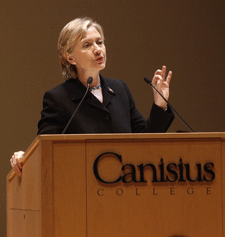Editors’ note: The following editorial was published in the first year of Bill Clinton’s presidency, when health care reform seemed like an inevitability. The title of the editorial: "Hold On, America, It’s Coming." Almost 15 years later, "it" still has not arrived, but health care reform is once again on the top of the Democrats’ agenda. In the December 3, 2007 issue, Mary Jane England lays out the challenges of universal health care.
New Yorkers walking through Manhattan certainly must pray that they won’t need emergency care. For one can hardly go a few blocks without the blast of a siren and the spectacle of an ambulance or fire truck boxed up in traffic. Let this be a metaphor for our health care system--apparatus clogged.
No one needs reminding of the specifics. Health care spending in the United States exceeds that of other industrialized countries by 50 to 100 percent. It stands at 1/7 of our national outlay. No discipline can be imposed upon it. For our money we get miracles of technology--imaging machinery, organ transplants, drug research--but they also contribute to half of the steep climb.
For our money we Americans endure the following: multiple providers ("Do I need a specialist for this awful earache?"), scant attention to wellness (non-coverage for physicals or well-baby visits or dental prevention), overbuilding and cost-shifting by hospitals, Byzantine paperwork and its minions, high anxiety about the continuance of one’s coverage--or even higher anxiety among the hard-working uninsured.
Not to despair, however. Many of our 50 states, bleeding profusely from Medicaid costs, have taken resolute steps, such as requiring employers to insure their workers (Hawaii), prioritizing access to health technology (Oregon), setting up health alliances or buying pools (Washington), fostering integrated networks with the primary-care doctor as gatekeeper (Minnesota), capping insurance costs for state employees (California), trying out a single-payer system (Vermont).
Hospitals, too, are moving to consolidate instead of competing, and to end duplication of services, and to draw doctors into a more amenable, H.M.O.-style relationship. The insurance companies are joining forces with doctors and hospitals, especially in preferred-provider plans, which steer patients to member physicians and hospitals for reduced rates.
Nonetheless, the Government is still the essential player. Somebody has to make decisions for the whole system: to guarantee that everyone is covered, no exceptions, and then to control costs. As long as any one sector is unprotected, the providers will shift expenses to it and recoup their losses, as they have been doing in California to offset the lower rates established for state employees.
So here come President and Mrs. Clinton with their health care plan dubbed "managed competition." The insurance companies may scream at it, charging that its central mechanism, the health alliances (which negotiate rates with insurers and providers in a given region), will run out of money because of tight budgeting. (Newsweek, Oct. 4, pronounced this "highly unlikely.") Clinton’s plan is nonetheless market-based, dependent on canny shopping by employers and health care consumers. It is almost Republican in its insistence on some sharing of payment (copayment) by individuals.
Many objections have been aired against the Clinton Plan. The American Medical Association charges that quality will diminish (and frets that so will the fees of specialists). What! despite the Hippocratic oath? In actuality, people can observe already, on their way out of the seven-minute doctor visit, that quality is not so hot now.
Small businesses on a slim margin--the restaurant, the copy center, the specialty shop, the mom-and-pop store--blanch at having to insure low-wage employees. The Government, however, has promised them some subsidy. The Clinton plan will exclude illegals, as posing a large and amorphous burden. This, however, will affect child care, for one thing, and hurt the urban hospitals where the uninsured come in desperation with illnesses that should have been treated earlier.
And where, critics ask Mr. and Mrs. Clinton, will the financing come from to cover the 38 million now uninsured, to fund the regulatory bureaucracy and to support new items in the benefits package--long-term care for the elderly, mental health costs (insisted upon by Tipper Gore)? The President counts on large savings from Medicaid and Medicare and has also suggested one or other "sin tax." Congress is sure to be dubious.
The benefits package that the Clintons propose includes funding for abortion, which is odious to many, including the editors of this magazine. How the termination of an inchoate life can qualify as "health care" is a mighty big question. "The mother’s well-being" hardly compensates for the precious individual not allowed to form.
ALL IN ALL, the Clinton plan, though probably too cumbersome and with glaring defects that still can be remedied, is brave and necessary. Regrettably the President ruled out the single-payer plan. Despite the greater efficiency and simplicity of such a program, he would have to fund it with taxes, which voters would likely resist (though they would be spared insurance premiums), and he would have to drive insurance companies from the field (though they could metamorphose into potent health-provider systems). So a single-payer plan seems a "pure futurible," as the Scholastic philosophers would put it, and all our attention must go into making the Clinton plan as good and right as can be.








